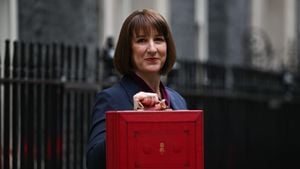With tensions simmering anew, Israel is hinting at a potential ground offensive against Hezbollah amid rising hostilities between the two factions. Israeli Defense Minister Yoav Gallant recently indicated to local leaders during a meeting, "The next stage in the war against Hezbollah will begin soon," signaling plans to escalate military actions as part of broader strategic objectives. This statement has amplified concerns of heightened conflict, not only within Israel but also across the region.
Smokes billow across the skyline of Tyre, southern Lebanon, where recent confrontations have underscored the fraught situation. The declaration from the Israeli government follows weeks of cross-border skirmishes, highlighting the deterioration of what has previously been tense but relatively contained hostilities. Gallant noted, "This next phase will contribute to achieving the war aim of returning residents evacuated from the area to their homes," indicating Israel's dual goals: ensuring security for its own citizens and eliminating perceived threats from Hezbollah.
Iran's role complicates the situation, as reports suggest it will not send forces to Gaza or Lebanon to assist Hezbollah during this potentially pivotal moment. This decision by Iran’s leadership suggests they are weighing their involvement carefully, particularly amid Israel’s evolved military posture and renewed confidence following recent events. Yet, it remains to be seen whether this means Hezbollah will scale back its activities or if it will provoke more aggressive moves by the group, already known for its formidable military capabilities.
Meanwhile, reactions from Hezbollah have been swift and defiant. The Shiite militant group, supported significantly by Iranian arms and resources, appears poised to continue its operations against Israel even if Iranian troops are not directly participating. The rhetoric from Hezbollah's leadership reiterates their commitment to engaging with Israeli forces should the ground offensive materialize, underscoring the likelihood of extensive violence should Israel proceed.
This looming conflict, following the death of prominent Hezbollah leader Hassan Nasrallah, paints a picture of potential chaos. Nasrallah's absence raises questions about leadership stability within Hezbollah, yet the group remains operational, asserting they are ready for increased confrontation.
Gallant's statements come amid diplomatic efforts elsewhere, where leaders from Iran have ramped up discussions about regional security but seem currently set on not engaging directly with Israeli forces. This decision reflects Iran’s strategic recalibration under current geopolitical pressures, contributing to the fluid environment surrounding the Israel-Hezbollah dynamic.
International observers continue to track the developments closely, with opinions divided sharply. Some argue for restraint, citing the humanitarian consequences of another major conflict. Critics of Israeli policy warn against plans to invade, arguing it would lead to devastating losses on all sides, including civilian casualties, potential refugee crises, and broader instability across Lebanon and the wider region.
Netanyahu’s administration faces increasing pressure as it navigates public sentiment, elements of which could drastically shift if military actions lead to high civilian casualties. The political ramifications within Israel are equally significant; public support for military action might wane if Israeli forces suffer heavy losses or if civilians are hit during operations. Israel's leaders must weigh their strategic interests against the potential humanitarian fallout and the risk of international condemnation.
Hezbollah's resilience is underscored by its local support base, which remains firm due to its history of resistance against Israel and perceived defense of Lebanese sovereignty. The group has garnered substantial support by framing its opposition to Israel as liberation efforts, which complicates any direct military solution on Israel's part. Success against such entrenched sentiments often requires not just military might but also political savvy.
Further complicate matters, the alliance structures within the region continue to evolve. Commitment from other Middle Eastern states might alter the existing strategic calculus—while some nations normalize relationships with Israel, others like Iran and its affiliates may dig their heels in, fostering environments ripe for conflict.
The possibility of international mediation looms on the horizon. Engaging global powers has often altered regional dynamics, though the effectiveness of such interventions has been mixed. Understanding how world powers address this potential escalation could determine whether the situation remains manageable or spirals out of control.
The risk of escalation remains high, as both sides prepare for what could become another drawn-out conflict reminiscent of previous engagements. Israel's military strategy seems resolved, but the possibility of unpredictable actions from Iran and Hezbollah adds to the complexity of the situation.
For residents on both sides of the Israel-Lebanon border, uncertainty reigns. Recent conflicts have forced many to flee their homes, and concerns about safety loom large. The human cost of renewed conflict could be substantial, with risks extending beyond mere military engagements to the disruptions of lives, families, and communities.
So, as Israel prepares for potential ground operations against Hezbollah, the situation will surely remain dynamic. The interplay between military strategies, regional alliances, and political narratives suggests we are on the cusp of developments worth closely monitoring. All eyes will be on how these tensions unravel and what responses—both military and diplomatic—emerge.



